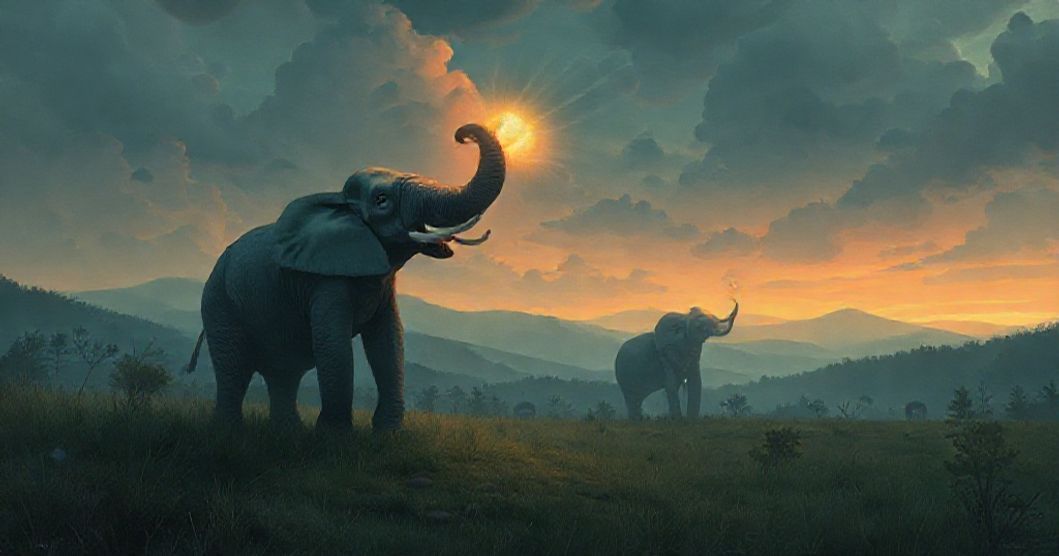Part 1: Dream Presentation
Dreams often arrive unannounced, carrying symbolic messages from our deeper consciousness. Consider this vivid dream experience: For months, a recurring nightmare has haunted the dreamer in a rural Appalachian setting. The dream begins in a bus stop—a paradoxical location in a region without public transportation—where the dreamer sits on a weathered bench alongside strangers, all waiting for something that never materializes. The stillness is broken by a blaring horn, not the expected sound of a bus but a jarring, metallic blast that sends dust swirling through the air. As the dust clears, elephants—massive, gray, and utterly out of place in this quiet valley—trumpet loudly, their presence defying the dreamer’s reality. In another variation, a disheveled man blows a conch shell, the sound echoing like a dying whale and jolting the dreamer from deep sleep. The dreamer’s home, with its carbon monoxide alarms and electric appliances, contrasts sharply with the chaos of the dream, yet the dream’s urgency remains indelible.
Part 2: Clinical Analysis
Symbolic Landscape: The Unseen in Familiar Ground
Want a More Personalized Interpretation?
Get your own AI-powered dream analysis tailored specifically to your dream
🔮Try Dream Analysis FreeThe rural Appalachian setting serves as both literal context and symbolic container. In dreamwork, rural landscapes often represent the unconscious’s connection to rootedness and tradition, while unexpected elements like elephants introduce the wild or unprocessed aspects of the psyche. Elephants, as Jungian archetypes, embody memory, strength, and the 'collective unconscious'—their appearance in a place without them suggests the intrusion of repressed or unexpected aspects of self. The bus stop itself functions as a liminal space: a threshold between waiting and arriving, representing the dreamer’s own life transitions and unmet expectations. The horn and conch, both sound-based symbols, act as disruptive forces—their loudness signifies overwhelming internal or external pressures breaking through the dreamer’s sense of control.
Psychological Undercurrents: Jungian and Freudian Perspectives
From a Jungian lens, the elephants may represent the 'shadow'—those parts of the self we’ve denied or suppressed, now manifesting as an unexpected, wild presence. The bus stop’s stillness mirrors the dreamer’s daily routine, while the elephants disrupt this order, forcing confrontation with what feels foreign or threatening. Freud might interpret the dream as a manifestation of repressed anxieties: the rural setting could symbolize a desire for safety, while the elephants represent fears of losing control or encountering the 'wild' aspects of life (perhaps related to unprocessed grief, change, or identity shifts). The conch shell, with its association to ancient rituals and communication, might symbolize the dreamer’s need to 'awaken' to deeper truths or repressed memories.
Emotional & Life Context: Appalachian Identity and Unprocessed Change
The dreamer’s connection to Appalachia is significant—this region often carries cultural weight tied to tradition, isolation, and resilience. The absence of elephants in reality, combined with the rural setting, suggests a tension between the dreamer’s desire for stability and an underlying restlessness. The bus stop, a place of transition in a non-transitional environment, could reflect feelings of being 'stuck' or waiting for something to change. The recurring nature of the dream indicates that these themes are unresolved: the dreamer may be navigating major life changes (career, relationships, identity) but struggling to process them consciously. The carbon monoxide alarms and electric home symbolize the dreamer’s awareness of safety needs, yet the dream’s chaos suggests an unaddressed fear of 'gaslighting' or self-deception—doubting whether their reality (safe, electric, familiar) matches their inner experience.
Therapeutic Insights: Reflecting on the Unseen
For the dreamer, this recurring dream offers an invitation to explore the 'elephants' in their life—those unexpected challenges or suppressed aspects that demand attention. Journaling about daily routines and unmet needs could reveal patterns: the bus stop might correspond to waiting for opportunities or closure. Reflecting on the horn’s source (unknown, not a bus) suggests the dreamer’s resistance to acknowledging external pressures (work, family expectations) that feel 'uncontrollable.' The conch shell, with its association to awakening, encourages the dreamer to 'blow' their own horn—asserting their voice in situations where they’ve felt silent.
FAQ Section
Q: Why do elephants appear in my Appalachian dream?
A: Elephants symbolize the 'wild' or unexpected in your psyche—they may represent suppressed creativity, unprocessed grief, or fears of the unknown in your familiar environment.
Q: What does the bus stop symbolize in my recurring dream?
A: The bus stop is a liminal space, representing transitions, waiting, and unmet expectations. It may reflect your life’s current 'in-between' phase, where you’re unsure of your next step.
Q: How can I connect this dream to my waking life?
A: Notice recurring emotions: if elephants feel threatening, explore what 'wild' aspects of yourself you’ve suppressed. If the horn feels overwhelming, examine unacknowledged stressors in your daily routine.
